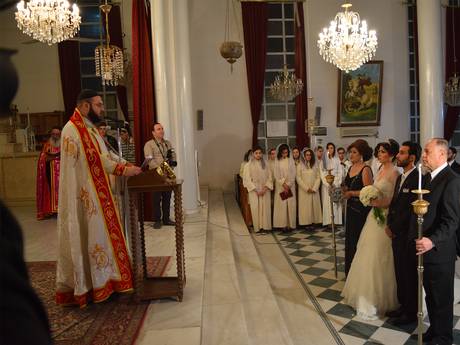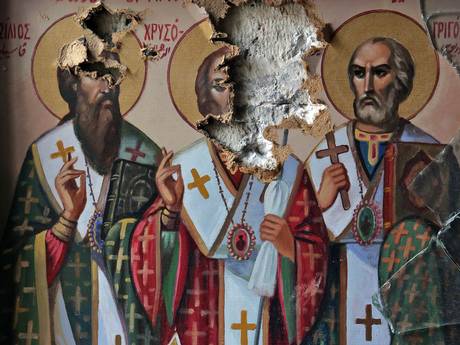Just 15 miles from the frontline of Isis, which persecutes their faith, the Christians of Qamishli gathered in the Church of the Holy Virgin for the wedding of Malek Aissa and Ilana Hacho.
The bride was a priest’s sister, the bridegroom a computer engineer, and they were greeted by ululations and the ancient choruses of the Syriac church, sung by a choir of young women dressed all in white and a row of clerics in pink, gold, scarlet and black robes. If you needed to be reminded that Christianity was an Eastern – not a Western – religion, Malek and Ilana’s wedding was proof enough. There were a multitude of blessings, a host of blazing candles, and more ululating between prayers.
But the church was only half full and the empty pews told a tragic tale. For of Qamishli’s Christian population of almost 8,000 souls, only 5,000 remain – and many of them are talking of leaving. Isis has seen to that.
The destruction and the killing of Christians around Mosul earlier this year was the moment of panic, and even the main road south from Qamishli to Hassake is dangerous. The city, isolated in the far north-east of Syria, has a cordon of army regiments and local militias to defend it, and the land to the east is held by armed Syrian Kurds. But the Turkish border is closed, and the rest of the land around the city is held by Isis and its fellow Islamists.
This exodus of Christians from the Middle East – as they themselves attest – only began after the Anglo-American invasion of Iraq, whose architects, as we all know, are born-again Christians.
“When the Christians had to flee Mosul and the valley of Ninevah, the Christians here thought that what happened in Iraq would happen here in Qamishli,” said Fr Saliba after participating in the night-time wedding service. “Isis did many things during this period to frighten us, so our people are migrating. Of course, as a church we don’t want anyone to migrate. But what can we do?” Fr Saliba has already lost almost half of his own parish.

The groom’s parents invited me to their wedding party, but it was the priests I needed to talk to, seated in their meeting room, robes discarded in favour of cassocks of pitch black which somehow suited their mood. They all condemned Isis and several claimed – as many Syrian government supporters often suggest – that the “Islamic State” is an American “product”, intended to break up the countries of the Middle East.
I am not sure that all these priests actually represent their people, not least because some of those who have fled have sought exile in the safety of the United States. “We do not believe Isis represents Islam,” Fr Saliba said. “We have had a tolerant society in Syria and we have treated each other as equals for 1,400 years. The project of dividing our countries is to establish weak countries in their place which will be unable to defend themselves. We all know this was funded by the Gulf States.”
There were several comparisons drawn between the Armenian genocide of 1915 and the plight of today’s Christians, and a sharp reminder of the tens of thousands of Syriac Christians who were also victims of the Turkish slaughter during the First World War.
Among the priests sat Fr Gabriel, his eyes rimmed with tiredness, his face dark, sick ever since he fled his Syriac church in Deir ez-Zour on 29 July 2012. “Nusra totally destroyed our church there and all our houses,” he said. “We thought we would be able to return in about 15 days…” Which is what many Palestinians thought when they fled their country in 1948.
Another priest spoke loudly of his own anger. “This loss of Christians is a very negative thing. The countries which encourage them to leave do not have their best interests at heart. They want to dissolve them in their societies. The Orient is a mosaic of different peoples and the West does not like this. If the West really wants to help us, they should help us to stay here and live in dignity. But as long as there is a crisis, our people want to leave.”
And what would Christ have said if he had witnessed this exodus and the threat represented by Isis? Quick as a shot, Fr Saliba replied. “He would have said ‘forgive them for they know not what they do’.” Another priest interrupted. “Christ would have wept as he wept for Jerusalem.”

Damaged icons inside the church of the monastery of Saint Takla in the ancient Christian town of Maalula, 56km from Damascus (Getty)
In central Syria, these clergymen estimate that as many as 80 Christian Syriacs have been murdered, and a far larger number were killed serving in the Syrian government army. The Armenians, whose broken bones can still be found in the fields around Qamishli haunted us all again.
Fr Saliba reminded his colleagues that at the time of the genocide, the Armenian dead represented more than twice the population of Syriac Christians at that time. And then he returned to his own flock.
“The West is not receiving us because they are Christian countries. They are secular countries. They want to destroy the Christian community here because they know that the Syriacs have deep roots here. In a couple of generations, the Syriacs in the European communities will have disappeared.
“After Mosul, France said: ‘We will take the Christians in’, but we believe we should live here. Even now, when we are trying to get our message out and, despite the media, we are not able to get the word across. Now Isis tries to destroy us so we will have no place in this country. We knew early on that this project was an existential challenge to our presence in the Middle East.”
The Syriac church has deep roots in Qamishli. Half the bishops in its synod come from here and they recall that Bashar al-Assad, when he met the synod in Damascus, told them that “Syria is your homeland, wherever you may be”. But Assad cannot stop this flight of Christians any more than he could protect large areas of eastern Syria.
“We gave Syria our name,” one of the priests said. “This is part of our heritage.” If only the men who went to war in Iraq could hear that.
